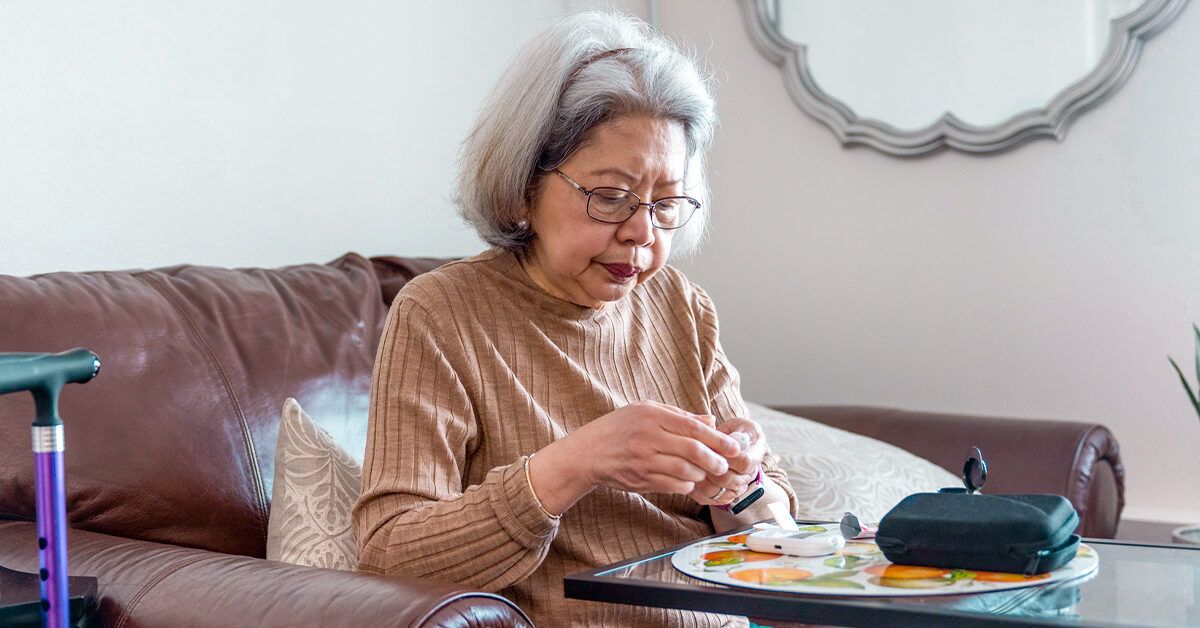
- Select a language for the TTS:
- UK English Female
- UK English Male
- US English Female
- US English Male
- Australian Female
- Australian Male
- Language selected: (auto detect) - EN
Play all audios:
You can help lower your risk of diabetes-related eye damage by keeping your blood sugars in target range, taking your medications as prescribed, and following your care plan. Living with
diabetes, especially over the long term, can cause many complications throughout your body. One of the most common complications of diabetes is damage to your eyes and vision. This is
because the eye is a delicate organ containing many tiny blood vessels and cells that work together to allow vision. Those blood vessels can be easily damaged by high blood sugar levels over
the course of a lifetime. Damage to those blood vessels is the main cause of diabetic retinopathy, decreased quality of vision, and vision loss in people with diabetes. This article will
explain how you can protect your eyes from the damage that diabetes may cause. Is it possible to prevent eye damage from diabetes? It’s possible to prevent damage from diabetes-related eye
disease. While diabetic retinopathy is common and makes up 80% of vision loss in people with diabetes, there’s no guarantee you’ll develop this complication. But there’s also no guarantee
you can prevent this complication from developing. You can take several diabetes-related steps to lower your risk, though: * closely tracking your blood sugar levels and keeping them within
range that you’ve decided with your diabetes care team * visiting an eye doctor regularly for routine eye and diabetes-focused retina exams * staying active * food choices and meal plans
that fit your diabetes care plan * keeping tabs on your blood pressure and cholesterol * not smoking Even if you’re diagnosed with diabetic retinopathy, early detection and treatment can
lower the risk of blindness by 95%. DISCOVER MORE ABOUT TYPE 2 DIABETES What to Eat Essentials Blood Sugar Medications Insulin Metformin How common is diabetic retinopathy? Diabetic
retinopathy is common complication of diabetes, affecting nearly 1 in 3 people who have the condition. It’s the most common cause of vision loss in people with diabetes. The prevalence of
retinopathy is strongly correlated with how long you’ve had diabetes, as research shows that the longer you live with diabetes, the more likely you are to develop this complication. After 20
years of diabetes, research from 2015 shows nearly all people with type 1 diabetes and more than half of people with type 2 diabetes will have some degree of retinopathy. »MORE:Living with
diabetes? Explore our top resources. Can diabetes cause other eye issues beyond retinopathy? Diabetes can cause other eye issues in addition to diabetic retinopathy. Diabetes can also cause
the following conditions: * macular edema * cataracts * glaucoma In addition to retinopathy, all of these conditions can cause changes to your vision and vision loss. But with early
detection, diagnosis, and treatment, you can stop or slow down the progression of these conditions, and your remaining vision may be saved. Do genetics play a part in diabetic eye diseases?
Genetics do play a role in the development of diabetes-related eye diseases. Research from 2020 shows that family clustering studies have shown that genetics play a large role in the
development of diabetic retinopathy, with twins with non-insulin dependent diabetes mellitus showing a 95% agreement in the degree of severity of the condition. Additionally, it has been
found that diabetic first degree family members of people who progressed to later stages of diabetic retinopathy had a risk ratio of 3.1 for progression themselves, compared with people who
didn’t have such progression. Other research has found a race and ethnicity link, with African Americans, Hispanics/Latinos, and Native Americans/Alaska Natives having the highest risk of
developing diabetic eye diseases than other races and ethnicities. IMPORTANCE OF BLOOD SUGARS AND A1C RESULTS In-range blood sugars are a key part of lowering your risk of diabetes
complications, including eye disease. Your blood sugar is a measure of how much glucose is circulating in your bloodstream at any given time. The higher the number, the more sugar you have
in your body that isn’t being used by your body’s cells. Over time, high blood sugar levels in the bloodstream are detrimental to your health and can cause all sorts of complications,
including damaging the blood vessels throughout your body. This is important to know because your eye is made up of many tiny blood vessels that exchange oxygen, nutrients, and blood to and
from your eye. When these become damaged and leaky, your eyesight can become damaged. The A1C is a measure of your average blood sugar over the previous 3 months. The American Diabetes
Association recommends that most adults maintain an A1C under 7% to lower their risk of diabetes-related complications. Keeping your blood sugar and A1C within a healthy range is the best
way to prevent damage to your eyes if you live with diabetes. Are there medications or other ways to prevent damage? There are no specific medications to prevent diabetes-related eye damage.
But vitamins such as vitamin A, vitamin E, vitamin C, zinc, lutein, zeaxanthin, and omega-3 fatty acids may be beneficial and improve general eye health. Often, once you develop diabetic
retinopathy and it progresses to a point where it needs treatment, you may need medicated injections or laser treatment to help prevent the damage from worsening. This can help slow or stop
progression and prevent vision loss. Takeaway Diabetic eye damage is a common diabetes-related complication. While many people will experience a complication of the eye during their lifetime
if they live with diabetes, this isn’t inevitable. You can lower your risk of diabetes-related eye disease by maintaining healthy blood sugar and A1C levels, visiting an eye doctor
regularly, and maintaining a healthy lifestyle. Vitamins A, E, C, zinc, lutein, and zeaxanthin and eating foods rich in omega-3 fatty acids may also be helpful. If you currently have
diabetic retinopathy or eye damage, laser eye treatments, medicated injections, or surgery may be necessary to help preserve your vision.









